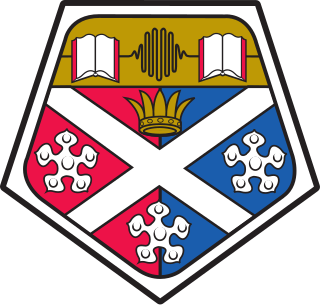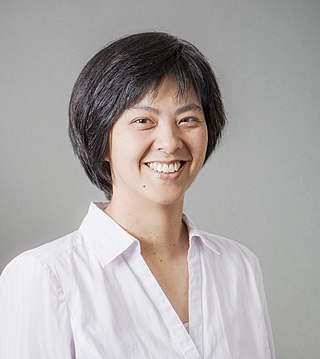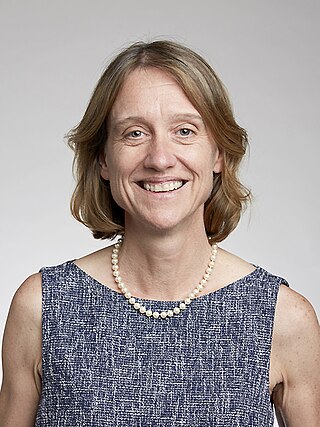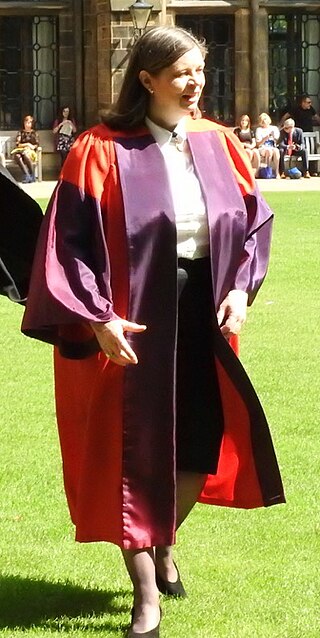Related Research Articles

The University of Strathclyde is a public research university located in Glasgow, Scotland. Founded in 1796 as the Andersonian Institute, it is Glasgow's second-oldest university, having received its royal charter in 1964 as the first technological university in the United Kingdom. Taking its name from the historic Kingdom of Strathclyde, it is Scotland's third-largest university by number of students, with students and staff from over 100 countries.

Christofer "Chris" Toumazou, FRS, FREng, FMedSci, FIET, FIEEE, FCGI, FRSM, CEng is a British Cypriot electronic engineer.
Dame Anna Felicja Dominiczak DBE FRCP FRSE FAHA FMedSci is a Polish-born British medical researcher, Regius Professor of Medicine - the first woman to hold this position, and the Chief Scientist (Health) for the Scottish Government. From 2010 to 2020, Dominiczak was the Vice-Principal and Head of the College of Medical, Veterinary and Life Sciences at the University of Glasgow, Scotland. She is an Honorary Consultant Physician and Endocrinologist for the NHS Greater Glasgow and Clyde Health Board, and Health Innovation Champion for the Medical Research Council. From 2013 to 2015, Dominiczak was president of the European Society of Hypertension. She is the current Editor-in-Chief of Precision Medicine, a new journal launched in July 2023.
Prof Robert Maximilian Kenedi FRSE (1921-1998) was a Hungarian-born engineer and bioengineer.

Tony Jun Huang is the William Bevan Distinguished Professor of Mechanical Engineering and Materials Science at Duke University.

Ellis Meng is the Shelly and Ofer Nemirovsky Chair of Convergent Biosciences and Professor of Biomedical Engineering and Electrical and Computer Engineering in the Viterbi School of Engineering at the University of Southern California, where she also serves as the Vice Dean of Technology Innovation and Entrepreneurship. Meng is highly decorated in the development of novel micro- and nanotechnologies for biomedical applications. In 2009, Meng was named on MIT Technology Review's "Innovators Under 35" List for her work on micropumps that deliver drugs preventing blindness, and she was listed on the 40 Under 40 List of the Medical Device and Diagnostic Industry (MDDI) in 2012.
Anne Neville was the Royal Academy of Engineering Chair in emerging technologies and Professor of Tribology and Surface Engineering at the University of Leeds.

Julia Alison Noble is a British engineer. She has been Technikos Professor of Biomedical Engineering at the University of Oxford and a fellow of St Hilda's College since 2011, and Associate Head of the Mathematical, Physical and Life Sciences Division at the university. As of 2017, she is the chief technology officer of Intelligent Ultrasound Limited, an Oxford spin-off in medical imaging that she cofounded. She was director of the Oxford Institute of Biomedical Engineering (IBME) from 2012 to 2016.In 2023 she became the Foreign Secretary of The Royal Society.
Rhonda Franklin is a professor of electrical and computer engineering at the University of Minnesota. She is a microwave and radio frequency engineer whose research focuses on microelectronic mechanical structures in radio and microwave applications. She has won several awards, including the 1998 NSF Presidential Early Career Award for Scientists and Engineers, the 2013 Sara Evans Leadership Award, the 2017 John Tate Award for Excellence in Undergraduate Advising, and the 2018 Minnesota African American Heritage Calendar Award for her contributions to higher education.

Kathleen Elizabeth Tanner is the Bonfield Professor of Biomedical Materials at Queen Mary University of London. Her research focusses on developing materials with particular biological and mechanical properties for use medicine, particularly those used for bone replacement. Tanner developed HAPEX, a bone mineral composite biomaterial, which was used in over half a million middle ear transplants in the 1990s.

Muyinatu "Bisi" A. Lediju Bell is a researcher and faculty member. She is the John C. Malone Associate Professor of Biomedical Engineering, Electrical and Computer Engineering, and Computer Science at Johns Hopkins University. She is also the director of the Photoacoustic and Ultrasonic Systems Engineering Laboratory.
Tania S. Douglas was a Professor of Biomedical Engineering, Research Chair in Biomedical Engineering and Innovation as well as Director of the Medical Imaging Research Unit in the University of Cape Town (UCT), South Africa. She conducted research concerning medical innovation, image analysis, and the development of technologies to improve medical device innovation in South Africa. She was also the founding Editor-in-Chief of Global Health Innovation, a journal which disseminates research results about health innovation in developing settings.

Gail McConnell is a Scottish physicist who is Professor of Physics and director of the Centre for Biophotonics at the University of Strathclyde. She is interested in optical microscopy and novel imaging techniques, and leads the Mesolens microscope facility where her research investigates linear and non-linear optics.
Carol Trager-Cowan is a Scottish physicist who is a Reader in physics and Science Communicator at the University of Strathclyde. She works on scanning electron microscopy, including Electron backscatter diffraction (EBSD), diffraction contrast and cathodoluminescence imaging.
Nirmala (Nimmi) Ramanujam is an educator, innovator, and entrepreneur. Ramanujam is recognized for creating globally accessible technologies for women’s health related to cancer screening, diagnosis, and treatment. She is the Robert W. Carr Professor of Engineering and Professor of Cancer Pharmacology and Global Health at Duke University. She founded the Center for Global Women’s Health Technologies in 2013 to catalyze impactful research, educational and community outreach activities that promote women’s health. In 2023, she won the IEEE Biomedical Engineering Technical Field Award, given annually for outstanding contributions to the field of Biomedical engineering. In 2019, she received the social impact Abie Award for making a positive impact on women, technology, and society. She was elected as a fellow of the National Academy of Inventors in 2017. She founded Calla Health to commercialize technologies developed at the center. Further she has created a number of initiatives and consortia including WISH, (In)visible Organ and IGNITE to have far reaching impact in cervical cancer, reproductive health and engineering design education, respectively.
Julia A. Schnabel is Professor in Computational Imaging and AI in Medicine at Technische Universität München, Director of the Institute of Machine Learning in Biomedical Imaging at Helmholtz Zentrum München, and Chair of Computational Imaging at the School of Biomedical Engineering and Imaging Sciences at King's College London. Previously, she was Associate Professor in Engineering Science at University of Oxford where she became Full Professor of Engineering Science in 2014.
Audrey K. Ellerbee Bowden is an American engineer and Dorothy J. Wingfield Phillips Chancellor's Faculty Fellow at Vanderbilt University, as well as an Associate Professor of Biomedical Engineering and Electrical Engineering. She is a Fellow of Optica, the American Institute for Medical and Biological Engineering and the International Society for Optics and Photonics (SPIE).
Esther Rodriguez-Villegas is a Spanish engineer, inventor and the Professor of Low Power Electronics at Imperial College London. Rodriguez-Villegas develops lightweight, low-power electronic devices for real-time monitoring of physiological signals. She was awarded the 2020 Royal Academy of Engineering Silver Medal for her work on wearable medical devices. In 2020, she was elected a Fellow of the Royal Academy of Engineering.
William Wasswa is a Ugandan lecturer, engineer and researcher. He serves as a senior lecturer in the Department of Biomedical Sciences and Engineering at Mbarara University of Science and Technology in Uganda.

Igor Meglinski is a British, New Zealand and Finnish scientist serving as a principal investigator at the College of Engineering & Physical Sciences at Aston University, where he is a Professor in Quantum Biophotonics and Biomedical Engineering. He is a Faculty member in the School of Engineering and Technology at the Department of Mechanical, Biomedical & Design Engineering, and is also associated with the Aston Institute of Photonic Technologies (AIPT) and Aston Research Centre for Health in Ageing (ARCHA).
References
- ↑ "Prof Patricia Connolly". www.strath.ac.uk. Retrieved 2023-07-30.
- ↑ "About Us", Strathclyde Institute of Medical Devices, University of Strathclyde, retrieved 2022-10-16
- ↑ Staff update, University of Strathclyde, 21 April 2022, retrieved 2022-10-16
- ↑ "OHMedics Ltd". Companies House. Retrieved 2022-10-23.
- 1 2 "Prof Trish Connolly", Our organisation, Association of British HealthTech Industries, retrieved 2022-10-16
- ↑ "Patricia Connolly", IEEE Xplore, IEEE, retrieved 2022-10-16
- ↑ "Patricia Connolly - Research output". University of Strathclyde. Retrieved 2023-07-30.
- ↑ "Professor Patricia Connolly", Fellows, Royal Society of Edinburgh, retrieved 2022-10-16
- ↑ "Fellows" (PDF), Annual Review Annex, Royal Academy of Engineering, p. 3, 2014–2015